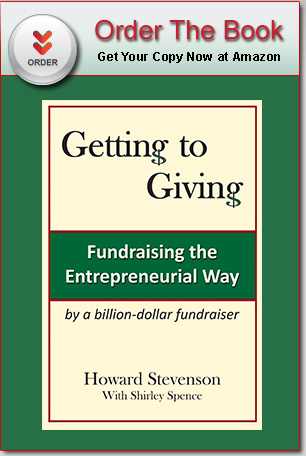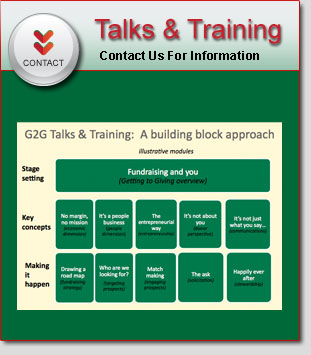How can you get a sense of whether there is a match between your organization’s mission and your prospect’s interests that could inspire a significant gift? As the “match maker,” you will need to understand what makes your prospect tick, help him understand what your fundraising organization is all about, and probe for possible collaborations.
The basic data should be in hand from prospect research: education, career, estimated financial worth, and philanthropic activities, for example. As you actively engage your prospect, there are some subtle and difficult things to determine. Here are the six questions you need to be able to answer:
- What does he really care about? He may be quite clear about his personal vision and priorities. Or not. He may look to you for help thinking through ways to be strategic in his giving. Also, he may never have made a significant gift, and be unclear about the options. Listen, offer your experience and insights, and provide information. But, be transparent in your role as the bridge between your institution and the prospect, even as you work to help him meet his philanthropic aims. You are not his financial adviser.
- What motivates him? Philanthropy is an opportunity to satisfy four basic human motivations: achievement, significance, legacy, and happiness. It’s helpful to understand what motivates your prospect. Someone who is achievement-oriented might join an arts organization to be invited to the “right” parties. Someone who wants to be of significance will be eager to help in a dire emergency. Someone who wants to leave a legacy may give before or after death, with or without acclaim. And, happiness? Gratitude and “payback” for personal success may be involved, but most donors just plain feel good when they give.
- What “language” does he speak? Language is about sense making, about how someone thinks about the world. With an MBA, you talk numbers. With a conservationist, you talk vernal pools. Personal philosophies will vary. If someone’s politics tend to the right, you might talk about philanthropy and our duty to help the poor. If someone is in the liberal camp, you might phrase it as achieving the goals of equal opportunity. Language manifests itself in how people like to receive information, too. A one page description? Volumes of data? Lots of pictures and graphics? Once a month, nicely bound? Real time, online?
- How much personal involvement is he likely to want? This can vary dramatically. Some individuals may want extensive detail on the project, and expect considerable control over the use of their donated funds. Other donors, by preference, will be quite hands off. And some donors simply won’t have the time. You have likely heard of the Three T’s; donors can offer time, talent, and treasure. It’s much easier, for some, to write a check than to spend time engaged in the project at hand, or the organization in general.
- What is the role of the spouse or family? It is increasingly rare, in a family situation, that just one person makes a decision when a significant amount of money is on the table. Other family members may be involved, or a family foundation. It may be less a matter of getting them excited, and more about making sure they won’t veto the endeavor. The role of the family may be nominal or significant in such areas as the size of the gift, the terms of agreement, or the actual oversight of its use. For endowed gifts, the role of future generations also must be considered.
- Is he a person you can read easily, or will it be a poker game? Talking on the phone and writing – electronically or the old-fashioned way – can take you only so far. A big part of the value of in-person meetings is the opportunity to “read” body language and facial expressions, and hear tone of voice. If a poker game it will be, better to be aware of it upfront. In those cases, it can be especially helpful to have someone with you at meetings, to watch for subtle signs of the prospect’s reactions or intentions.
At the risk of beating a dead horse, a reminder: it’s more about listening than talking. An attentive ear and some emotional intelligence can get you the information you need to educate the prospect about your organization, from his perspective, and probe for a possible match.



